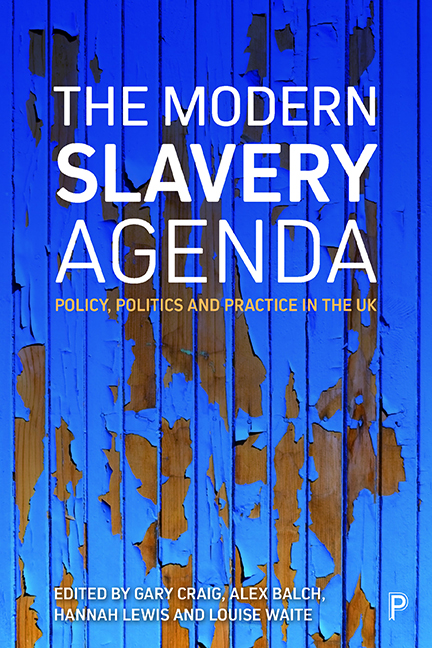Book contents
- Frontmatter
- Dedication
- Contents
- List of tables, figures and boxes
- Notes on contributors
- Editorial introduction: the modern slavery agenda: policy, politics and practice
- one Modern slavery in global context: ending the political economy of forced labour and slavery
- two The UK’s response to modern slavery: law, policy and politics
- three Defeating ‘modern slavery’, reducing exploitation? The organisational and regulatory challenge
- four Class Acts? A comparative analysis of modern slavery legislation across the UK
- five Child trafficking in the UK
- six Human trafficking: addressing the symptom, not the cause
- seven Still punishing the wrong people: the criminalisation of potential trafficked cannabis gardeners
- eight Modern slavery and transparency in supply chains: the role of business
- nine Migrant illegality, slavery and exploitative work
- ten The UK’s approach to tackling modern slavery in a European context
- Index
nine - Migrant illegality, slavery and exploitative work
Published online by Cambridge University Press: 20 April 2022
- Frontmatter
- Dedication
- Contents
- List of tables, figures and boxes
- Notes on contributors
- Editorial introduction: the modern slavery agenda: policy, politics and practice
- one Modern slavery in global context: ending the political economy of forced labour and slavery
- two The UK’s response to modern slavery: law, policy and politics
- three Defeating ‘modern slavery’, reducing exploitation? The organisational and regulatory challenge
- four Class Acts? A comparative analysis of modern slavery legislation across the UK
- five Child trafficking in the UK
- six Human trafficking: addressing the symptom, not the cause
- seven Still punishing the wrong people: the criminalisation of potential trafficked cannabis gardeners
- eight Modern slavery and transparency in supply chains: the role of business
- nine Migrant illegality, slavery and exploitative work
- ten The UK’s approach to tackling modern slavery in a European context
- Index
Summary
Introduction
This chapter considers the position of migrants in the UK who experience severe labour exploitation. It addresses how – or whether – the emerging ‘modern slavery complex’ can adequately respond to the production and continuation of unfree labour relationships that produce conditions now grouped under the umbrella of ‘modern slavery’. We start from the point of understanding severe labour exploitation as emerging within a set of multidimensional processes embedded in the operation of labour markets and economies. This includes employer relationships with employees, migrants’ work and migration trajectories, and socio-economic and family status. For migrant workers, the backdrop of hostile immigration policies and politics is an important framer. We have argued elsewhere that the susceptibility of certain migrants at particular times to forced labour can usefully be understood as resulting from multidimensional ‘hyper-precarity’. Understanding forced labour as part of a spectrum of exploitation, produced by movement along a continuum from decent work to forced labour, necessitates a recognition of severe exploitation as produced within wider structures, including labour markets, migration governance and global inequalities. If the forms of exploitation being conjured in the overlapping concepts of forced labour, modern slavery, human trafficking, domestic servitude, labour exploitation and sexual exploitation are understood not as an exception, but as integral to wider economic systems, then this demands different sorts of responses than those that focus simply on ‘rescuing’ and removing individuals from moments of exploitation (Lewis and Waite 2015).
This chapter is principally concerned with migrants’ labour exploitation. For the purposes of the arguments presented here, it is possible to view various forms of exploitation through the lens of labour relations – including domestic servitude, sex work and, sometimes, transactional arrangements where these become exploitative (for more on the difficulties of distinguishing transactional labour from exploitation, see Waite and Lewis 2017). When we refer to forced labour, we are drawing on definitions developed by the International Labour Organisation (ILO 2012), which has laid out 11 indicators of forced labour. One distinction between forced labour and human trafficking, as defined in international law and guidance, is that human trafficking is understood to include forms of movement, transportation or harbouring, while forced labour can occur without movement or harbouring elements, particularly in situations where a worker enters a labour situation offered under ‘decent work’ conditions that later deteriorate.
- Type
- Chapter
- Information
- The Modern Slavery AgendaPolicy, Politics and Practice in the UK, pp. 219 - 242Publisher: Bristol University PressPrint publication year: 2019



